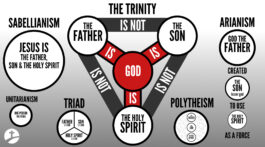I like to start by asking those who sense they are being awakened to their true “Jewish/Israelite” identity: (1) Where does the Bible say the Israelites will lose their identity? & (2) Where does the Bible teach it is the job of disciples to help Israelites find their lost identity?
Four Points that Debunk the BHI (Black [So Called] Hebrew Israelites) Claims About Deut. 28:68
- NO LOST IDENTITY IN CURSE: No where in the text does it say that one of the curses would entail the Jews losing their identity and thus at some point they would need to use the curses as identification markers.
- NO FIGURATIVE LANGUAGE: You can’t have ships be literal and Egypt be figurative, along with the reference to the return journey to actual Egypt just stand for “bondage.” God said the Jews would, “go back in ships to Egypt on a journey I said you should never make again.” Thus, if ships are to be taken literal, so should Egypt. You cannot have one portion be figurative like Egypt standing for America and ships being literal slave ships, while neglecting the literal statement God said in regards to never wanting them to go to Egypt again (Deut. 17:16).
- NO BUYERS: God said it would be so bad in literal Egypt the second time that no one would buy them even as slaves, “no man shall buy you.” Which we all know didn’t happen in the U.S. because slavery was big money. So it would be worse then the first time they lived there as slaves because they were cared for and were able to survive. If the BHI try to assert that the Hebrews word for “buy” really means, “redeem” like in the sense of a “kinsmen redeemer” they have a translation problem because BHI are KJV Only-ists. As a result, they either have to admit there is an error in the KJV or accept that the Hebrew word, “qana” is properly translated in English as “buy” not “redeem back.” The Hebrew word “geula” is the general word for “redeem,” thus “qana” is only translated as “redeem” one time in the KJV in Nehemiah 5:8 (because it is supported by the context), whereas “redeem/buy back” in Deut. 28:68 would not make any sense since the whole nation would be in captivity and thus not have any rights. In Nehemiah’s time they were being restored back to Israel and were able to buy back their fellow Jews.
For extra proof consider the Targum Jonathan, which is an Aramaic translation of the Deut 28:68 from around the time of Jesus:
”And the Word of the Lord will bring you captive to Mizraim in ships through the Sea of Suph, by the way you passed over, of which I said to you, No more shall you see it. And there will you be sold to your enemies, at the beginning for a dear price, as artificers, and afterward at a cheap price, as servants and handmaids, until you be worthless and (be consigned) to unpriced labour, and there be none who will take you.”
https://www.sefaria.org/Targum_Jonathan_on_Deuteronomy.28.68?lang=bi
- THE REAL STORY: Lastly, the actual Jews did have the curse of Deut. 28:68 brought upon them in the time of 70 A.D. when the Temple was destroyed and they were taken as prisoners out of Israel and shipped to Egypt by the Romans. See the following historical accounts:
(i) Munter, Primordia Eccl. Africanae, pp. 85f., 113
“Now that Betar had been captured, everything came under human control, while ‘Palestine’ [Judah] was reduced to a desolate mound. Captives were sold into slavery in numbers too great to count. First they were brought to the grand annual market at the Terebrinth-Eloh tree in Hebron, or in the words of Hydranumous, to the Tent-Ohel of Abraham near Hebron. Each slave sold for the price of a horse. Those captives who were not sold were brought to the marketplace in Azza [Gaza] which, because of the great multitudes of slaves, who were sold there, was called Hadrian’s marketplace. And those who were still not sold there were herded into ships and were taken to Egypt. Many died in transit, whether by starvation or by shipwreck, while many were also killed by cruel masters.”
(ii) Emil Schurer, “A History of the Jewish People in the Time of Jesus Christ”, Edinburgh, 1896, p. 11
“Innumerable was the multitude of those who were sold away as slaves. At the Annual Market of Terebrinth of Hebron they were offered for sale in such numbers that a Jewish slaves was of no more value than a horse. What could not be disposed of there was brought to Gaza and sold or sent to Egypt, on the way to which many died of hunger, or of shipwreck.”
(iii) Josephus, “The Jewish Wars”, Book VI 9:2.
“Because the soldiers were now growing weary of bloodshed, and survivors appeared constantly, Caesar orders to kill only those who offered armed resistance and to take alive all the rest (415). The troops, in addition to those covered by their orders, slaughtered the aged and infirm; people to their prime who might be useful they hearded into the temple area and shut in the court of the women (Iccl. (416). Casear appointed one of his freedmen as their guard, his friend Fronto, to decide the fate appropriate to each (417). All those who had taken part in sedition and brigandage (they informed against [each] other) where executed. He picked out the tallest and handsomest of the lot and reserved them for the Triumph (418). Of the rest, those who were over seventeen he put in chains and sent to hard labor in Egypt while great numbers were presented to Titus to provinces to perish in the theatres by sword or wild beasts; those under seventeen were sold.”




